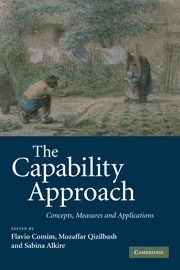Book contents
- Frontmatter
- Contents
- List of figures
- List of tables
- List of contributors
- List of acronyms
- Acknowledgements
- Introduction
- 1 Using the capability approach: prospective and evaluative analyses
- PART I Concepts
- 2 Amartya Sen's capability view: insightful sketch or distorted picture?
- 3 Sen's capability approach and feminist concerns
- 4 Beyond individual freedom and agency: structures of living together in the capability approach
- 5 Does identity matter? On the relevance of identity and interaction for capabilities
- 6 Measuring capabilities
- PART II Measures
- PART III Applications
- Index
- References
3 - Sen's capability approach and feminist concerns
Published online by Cambridge University Press: 22 September 2009
- Frontmatter
- Contents
- List of figures
- List of tables
- List of contributors
- List of acronyms
- Acknowledgements
- Introduction
- 1 Using the capability approach: prospective and evaluative analyses
- PART I Concepts
- 2 Amartya Sen's capability view: insightful sketch or distorted picture?
- 3 Sen's capability approach and feminist concerns
- 4 Beyond individual freedom and agency: structures of living together in the capability approach
- 5 Does identity matter? On the relevance of identity and interaction for capabilities
- 6 Measuring capabilities
- PART II Measures
- PART III Applications
- Index
- References
Summary
Introduction
There is by now a vast feminist literature arguing that mainstream normative theories (whether they focus on inequality, poverty, well-being, social justice or policy reform) are often false gender-neutral and androcentric. Theories are false gender-neutral and androcentric when they pretend to be theories which apply equally to men and women, but upon closer scrutiny they are focusing mainly on male experiences and interests, thereby ignoring aspects of social institutions, or dimensions of well-being, that are of special importance to women and children. Often these theories have a poor underlying notion of gender, or implicitly rely upon sexist or androcentric assumptions, or incorporate empirical claims about gender issues that are highly contested. Susan Okin's (1989) seminal work in this area criticised several social justice theories, ranging from communitarian to libertarian, for failing to properly incorporate the interests of women and families. Elizabeth Anderson (1999) critiques the ‘luck egalitarian’ theories within liberal political philosophy for not being able to adequately deal with women's caring responsibilities and the dependency of children, the disabled and frail elderly. Iris Young (1990) and Nancy Fraser (1998) have argued that theories of distributive justice are structurally limited in dealing with key feminist concerns such as the gendered division of labour. Eva Kittay (1999) showed that Rawls's (1971) theory of justice cannot adequately deal with the interests and needs of dependants and caregivers, and therefore cannot adequately account for inequalities between women and men.
- Type
- Chapter
- Information
- The Capability ApproachConcepts, Measures and Applications, pp. 82 - 104Publisher: Cambridge University PressPrint publication year: 2008
References
- 47
- Cited by



